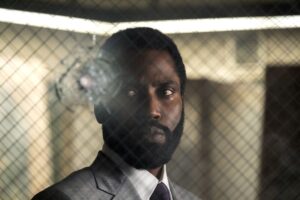There’s a certain set of neuroses associated with playing music that will resonate with anyone who’s ever picked up an instrument: that during practice you’ll out yourself as incompetent to your bandmates, that the inevitable screw-up will happen during a critical performance, that eventually you’ll encounter a part that is simply beyond your ability, etc. Perhaps the most existential of these fears is that ultimately your music will amount to nothing, that no matter how much you sacrifice, all your blood, sweat, and tears will leave no mark on the world. As one contends more seriously with music—from childhood piano lessons onto high school band onto professional work—these concerns become more and more pronounced. This is the main problem encountered in Damien Chazzelle’s Whiplash.
Whiplash is about Andrew Neyman (Miles Teller), a first-year student at a major music school in New York. Inspired by the great Charlie “Bird” Parker, he goes down the path of a jazz drummer, hoping to become as great and essential as his idol (Parker was a saxophonist, but whatever). When we first meet him, he’s stuck as the alternate in one of the school’s lesser ensembles, practicing until late hours hoping to advance. One day (partially by chance, partially by promise), he’s noticed by Terence Fletcher (J.K. Simmons), the respected and profoundly intimidating director of the school’s Studio Band, who takes him into his ensemble. Initially ecstatic, Neyman soon finds that Fletcher is an unbelievably demanding mentor, using borderline (if not outright) abusive tactics to push his musicians to what he believes is their true potential.
The film’s main concern is the extent of Neyman’s sacrifice for his craft. He moves his mattress into a practice room to constantly go over his music, he subjects himself to Fletcher’s nigh-sadistic education philosophy, he breaks up with his girlfriend to free up time, he shuns friendships, he alienates family. Most noticeably, his sacrifice to music (and that of some others) frequently manifests physically – this movie may have a record for most shots of bloodied drum sets in any film. It might be said that the film tries to drive this point home a little too hard (there are several points where things go a little too badly for Neyman), but the hyperbolic nature of the story feeds into the film’s overall intensity. It moves with the pace of, fittingly, a jazz drum solo: constantly moving forward, growing almost unbearably fierce at its apexes.
Speaking of fierce, it’s impossible to talk about this film without mentioning J.K. Simmons’ performance as the ultimate band director from hell. Long known as a great character actor, Simmons gets a chance here to burst from the background with a dominating portrait of a man uncompromisingly pursuing perfection. Fletcher always acts endlessly severe, whether he’s screaming obscenities at Neyman or attempting friendliness. Even physically, he always—save for a key few moments—maintains a tension of his muscles, of his tone of voice. Beneath this hard shell, though, Simmons maintains a softer interior, exposed only in moments of great emotion or in the middle of his one musical performance, suggesting that once Fletcher wasn’t too unlike Neyman, and also that there’s something human behind his severity.
Whiplash is an incredibly stressful movie, more than many would expect a movie about playing music to be, but richly rewarding all the way. From the subtly ominous opening scene to the sudden but satisfying conclusion, Damien Chazzelle maintains an engaging story of ambition, self-destruction, and what is truly necessary to be an artist.
And there’s some pretty bombin’ music, so that’s cool too.
Photo: IMDB






